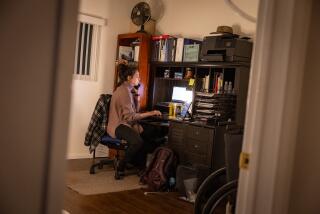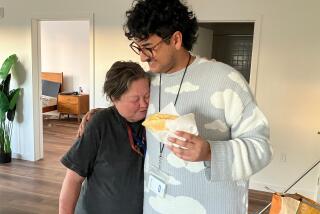Doing other people’s housework is their pride and joy
- Share via
Carol Furuya was so exhilarated after a day of doing the laundry and cleaning, cooking and running errands for some elderly people that she declared:
“I can’t believe I’m getting paid for this! It’s just what I would do on my own.”
The Homemaker Service of Pasadena Area has at least 50 others like Furuya: men and women who are professional homemakers because that is what they know and like.
Operating quietly with no big fund-raisers, no advertising and no government funding, the nonprofit Homemaker Service is celebrating 25 years in Pasadena, during which time it has served an estimated 17,500 people.
Since the service began, the number of people in the Pasadena area who need a little help at home has grown steadily, according to Joyce Maloney, executive director. Most clients are elderly, she said, but many are working people who need help in caring for an invalid at home. Others have just come home from the hospital and some are mothers with new babies. The service is available to anyone.
Maloney described Furuya as a typical homemaker: someone adept at household skills who wants a part-time job.
Furuya said: “I’ve been on every PTA board of every school my three children attended, but something happened--I’m not as wrapped up in children as I once was. So I thought maybe I could turn a natural aspect of my personality into something that could pay off. Now I can’t imagine doing anything else in my life.”
Working seven-hour days, she has two regular clients, “and I’d like to think I’ll be with them forever,” she said.
One of them, Martha Thomas, 78, is recovering from injuries from a fall. “Without Carol, I don’t know what would happen,” she said. “There isn’t anyone else around who could help me.”
Less typical but indicative of changing needs is homemaker Ed Newton, 20, a pre-med student at California State University, Long Beach, who fits his part-time job around his class schedule.
Recently, he arrived at a client’s home to find that his elderly charge had suffered a stroke. Like all of the homemakers, Newton is trained to handle such emergencies. He called for medical help and notified the man’s family.
“He’s in the hospital and I miss him,” Newton said. “The best part of this work is developing a closeness, feeling that this is a friend.”
Until the emergency, Newton arrived each morning to prepare breakfast and do light housework, making sure the man’s clothes were clean and occasionally taking him shopping. Newton has since been assigned to a new client.
“People are surprised when I tell them what I do, and most of them are even more surprised to find out that this kind of service is available,” he said.
Maloney said a major function of the service is managing a household when someone is ill, thus enabling the other family members to continue their regular work.
“This kind of relief is important for all members of the family,” she said.
Homemakers are carefully assigned to their clients, Maloney said, adding that an increasing number of men ask for male homemakers.
Maloney said most people learn about the service by word of mouth; some are referrals from hospitals and other agencies. A 27-member board of directors heads the agency, which was started by the Junior League of Pasadena.
The service costs $9.70 an hour, and there is a subsidy program for those who cannot pay the full amount. The homemakers earn between $5 and $7 an hour, plus overtime. They also are paid for attending monthly training programs that feature talks by professionals in health care.
“Being a homemaker doesn’t really cover the kind of worker we have,” Maloney said. “Our people are worth double what they’re paid. But we have to make this affordable to people who need us.”
Furuya, who joined the service six months ago, said: “The pay isn’t the important thing. I forget sometimes when payday is. If we charged what we were worth, people couldn’t afford us.”
She said she has discovered that “you become emotional support for people after they’ve been at death’s door. They need a sounding board, and they come to rely on you and trust your judgment.”
Besides that, she has other talents to draw on.
“For instance, a client was having visitors from out of town and she had nothing prepared,” Furuya said. “I put together a buffet for eight, and I know how to throw a hell of a lunch. I didn’t get the laundry done, but somehow it always balances out.”
More to Read
Sign up for Essential California
The most important California stories and recommendations in your inbox every morning.
You may occasionally receive promotional content from the Los Angeles Times.






